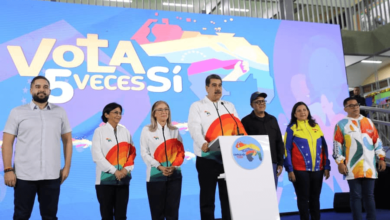On June 26, workers at Fundimeca, an air conditioning factory in Valencia, Venezuela, went on strike to protest the management’s refusal to adhere to a court ruling instructing the company to reinstate nine workers who were fired in November 2007. Since the strike began, one worker has been shot and 21 others are facing criminal charges. Of the 360 workers employed at Fundimeca, 80 percent are women.
|
Fundimeca management then tried to win a court ruling to force the workers to leave the factory. Judge Mauricia María Gonzalez, a member of the United Socialist Party of Venezuela (PSUV), ruled on July 3 and again on July 18 that the workers had to vacate the premises. The workers disobeyed the first ruling, then complied with the second ruling after the company agreed to rehire the nine workers fired last year and withdraw all charges against the workers who had occupied the factory.
After the workers ended the occupation, the company broke the agreement and arrest warrants were issued on Aug. 4. Those workers facing criminal charges include the strike organizers, union leaders and members of the PSUV. Leading up to the strike, organizers were monitored and received phone calls threatening them with jail time for their organizing efforts.
The struggle at Fundimeca is part of renewed union activity that has been strengthened by a new constitution and labor laws supported by President Hugo Chávez. In response to the rising militancy and strength of the unions, the Venezuelan capitalist class has mobilized throughout the country to crush this growing movement.
The strike and occupation of the Fundimeca factory have also revealed a key contradiction in Venezuela. On the one hand, significant improvements in the living standards and working conditions of Venezuela’s workers have been made due to the efforts of President Chávez, the PSUV and many union forces. However, the capitalist class still retains power in the institutions of the state and its control over large segments of the economy has not been dismantled. The private property interests of the capitalist class represent a primary obstacle to the forward march of the Bolivarian revolution.
The challenge facing the Venezuela’s proletariat and Bolivarian leadership is how to continue waging a revolutionary struggle that does away with capitalist property relations and replaces them with socialism.






